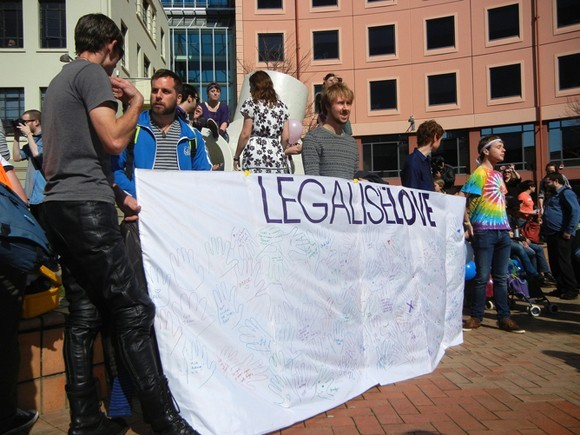Legalise love: New Zealand approved same-sex legislation in a midst of celebrations. NZN David Williams
The issue of same-sex marriage in Australia is again part of the national debate, after Independent MP Tony Windsor announced he was in support of a referendum on the question to be held in parallel with the federal election in September.
This comes after cheering and spontaneous singing broke out from the balcony of the New Zealand parliament earlier this month as MPs voted 77-44 in favour of same-sex marriage rights. The sense that decision makers had taken a historic step forward was palpable, even to the most cynical activists. Julia Gillard was reportedly “unmoved”.
A few days later, across the world in France, right wing protesters were forcibly evicted from the parliamentary chamber as MPs voted 321-225 in favour of similar reform.
France and New Zealand now join 12 other countries that recognise same-sex marriage. The list currently is: Argentina, Belgium, Sweden, Spain, Canada, Denmark, Iceland, Norway, Portugal, South Africa, The Netherlands and Uruguay. In the United States, same-sex couples can legally marry in nine states.
Different paths to marriage equality
The New Zealand and French campaigns for same-sex marriage rights appear to have taken quite different routes up the aisle. According to the press, the French path to equality has “divided a nation”. In New Zealand the impression seems to be that a “civilised” nation has come together.
There have been substantial protests in Paris in favour of same-sex marriage (estimates of around 125,000 people), but these have been met by even larger numbers (around 350,000) mobilising against. Violent clashes have broken out between protesters and riot police.
Large demonstrations from the right of politics have been less frequent in recent years, perhaps explaining why coverage of these protests has contained an element of surprise. The protesters have attempted to give their movement a more progressive veneer, calling it “Le Printemps Français” (the French spring, echoing the Arab revolutions that overthrew brutal dictators).
For LGBTI rights advocates and activists, the “non” campaign in France is particularly concerning because of the impact it is having on levels of homophobic violence, especially outside of the capital. Gay bars have been targeted, individuals beaten, and calls to LGBTI helplines and support services have increased.
Why the difference?
The French bill includes adoption rights for same-sex couples, and affects all legal partnerships, rather than just marriage. But the issues are essentially the same, legal recognition and equality for couples and families regardless of their gender.
According to polls, the majority of both the French and New Zealand populations agree with the reform. Polls in France consistently show 55-60% in favour; in New Zealand around 50-55%. In both countries, as with comparisons around the world, younger people are much more likely to be in favour of equal marriage rights.
Commentators in the mainstream press have given a range of reasons for the negative response in France, usually based on their own position. Most popular seems to be the role and power of the Catholic Church. Yet we have seen other notionally Catholic countries such as Spain and Portugal pass the same law without mass outcry. Others have argued that the anti-reform campaign has been cleverly pitched to a more mainstream audience, at a level that provokes a sense outrage.
Frigide Barjot, one of the leading campaigners in France argued that the law would “de-structure” society by “destroying the concept in law of mother and father”, changing the “essence” of the family. Similar arguments were made in New Zealand by Conservative Party leader Colin Craig calling the legalisation a “failure of democracy”, and warning that a “day of reckoning” would come.
Some have suggested the difference might be the relative size of the populations: the smaller number of New Zealanders have learnt how to get along, while the millions in France find it harder to reach agreement. There is no evidence for this.
What we do know is that in both countries the majority of elected politicians supported the bills, by genuine margins. The crucial difference here is the politics of the leadership.
The French parliament is led by the Socialist Party prime minister Jean-Marc Ayrault, with the support of Socialist Party president Francois Hollande. Before their election in 2012, the Socialist Party put same-sex marriage equality at the centre of their reform agenda. In New Zealand, the prime minister supporting the reform was centre-right National Party leader John Key.
For the ousted political right in France, this campaign has presented a clear opportunity to attack the new left-wing government in moralistic and emotive ways. They have seized this opportunity, working with far right groups, the church and others to wage a relentless battle. In New Zealand, support from conservatives (big and small “c”) has taken the wind out of opposition sails. Presented as a sensible reform, it becomes much harder to resist.
If Australians would prefer the New Zealand response rather than the French, the government and politicians of all parties must be confident to stand up for same-sex marriage rights. The suggestion of holding a referendum on the question is likely to lead to a strengthening of the right and an increase in homophobia. A “no” campaign in Australia could do serious damage to the health and wellbeing of LGBTI people across the country.
Alongside broader medical and legal reforms, granting same-sex marriage rights sends a clear message that homophobia and transphobia are not acceptable. The sooner the Australian government realises this, the better.
Author: Roz Ward
Publication: The Conversation
Publication Date: April 29 2013
Roz Ward
GLBTI Health Researcher and Co-founder of Safe Schools Coalition Victoria at La Trobe University

